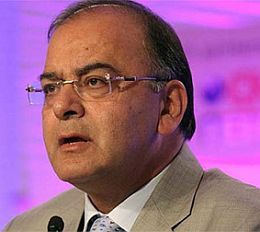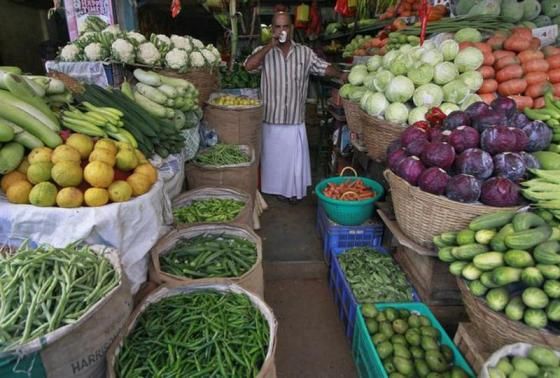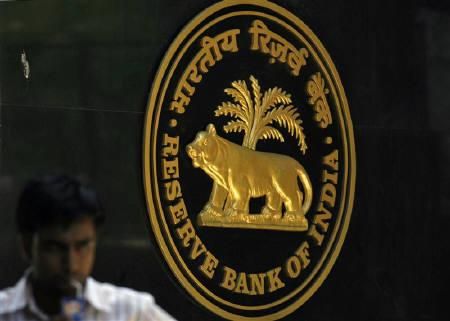 Food prices have been at the core of India's struggle in the past two years to beat low growth and high inflation, and Prime Minister Narendra Modi scored the biggest electoral mandate for 30 years in May on an economic reform ticket.
Food prices have been at the core of India's struggle in the past two years to beat low growth and high inflation, and Prime Minister Narendra Modi scored the biggest electoral mandate for 30 years in May on an economic reform ticket.
India has brought inflation under control and is committed to food market reform to achieve low and stable price rises, Finance Minister Arun Jaitley said after wholesale inflation dropped a near five-year low.
Wholesale prices rose 2.38 percent on year in September, its slowest pace since October 2009, as food inflation dropped to a near three-year low.
Tuesday's data came a day after consumer price inflation, which the central bank tracks to set policy lending rates, dropped sharply to 6.46 percent in September, the lowest since the latest data series started in January 2012.
Jaitley said a new monetary policy framework and fiscal consolidation will also help bring down inflationary expectations.
A smaller-than-expected surge in India's food prices sent inflation to a multi-year low, data showed on Tuesday, giving a boost to the new government that has promised to pull the economy out of its malaise.
Food prices have been at the core of India's struggle in the past two years to beat low growth and high inflation, and Prime Minister Narendra Modi scored the biggest electoral mandate for 30 years in May on an economic reform ticket.

Tuesday's figures showed that lower vegetable prices helped bring down wholesale food inflation to a near three-year low of 3.52 percent in September, and fuel inflation hit a near five-year low of 1.33 percent on falling global crude prices.
The wholesale price index rose an annual 2.38 percent last month, its slowest since October 2009, compared with the 3.3 percent forecast by economists in a Reuters poll.
Benchmark 10-year bond yields hit a 13-month peak as bond traders priced in more aggressive monetary easing next year.
On Monday, consumer price inflation, which the central bank tracks to set policy lending rates, dropped sharply to 6.46 percent in September, the lowest since the latest data series started in January 2012.
"It is heartening to note that we have been able to bring food inflation under control," finance minister, Arun Jaitley, said in a statement.
"We are confident that soon we will be achieving a low and stable inflation rate."
But economists say Modi's adminstration has yet to lay out a credible inflation strategy, beyond short-term improvisation, and India still urgently needs to fix a supply chain controlled by middlemen and boost farm productivity to prevent recurring food price shocks.

RISK FACTORS
As well as a prospective pick-up in domestic consumption stoking price pressures, patchy monsoon rains and floods in parts of India this year are likely to keep food inflation high.
Economists say the real picture of inflation will emerge only after November when a favourable base effect fades out and the impact of a sub-normal monsoon rains on summer-sown crops are more visible.
"We will see the lowest reading for inflation in November due to the statistical base effect," Bank of Baroda chief economist, Rupa Rege Nitsure, said.
"So it needs to be seen post-December how inflation pans out as the Reserve Bank of India (RBI) wants inflation to come down on durable basis."
Those concerns forced the central bank to leave interest rates on hold last month. And it is still not expected to lower rates until the April-June quarter.
At its policy review last month, the RBI sent a strong signal that it will hold off cutting rates until it is confident that consumer inflation will ease to 6 percent by January 2016.
A sustained fall in global oil prices, which are down more than 20 percent from the 2014 high in June, has brightened the near-term inflation outlook.
India imports more than 70 percent of its oil, and every $10 a barrel fall in prices lowers retail inflation by 20 basis points and wholesale inflation by 50.
A relatively stable rupee, weak domestic demand and a favourable statistical base are also expected to rein in price pressures.
But there remains a risk that oil prices could flare up again due to conflict in the Middle East and Ukraine.
Adding to the inflationary concern, India's trade deficit widened to a 16-month high of $14.25 billion in September, which could put pressure on its current account balance and the currency.
This will be a worry at a time when speculation about U.S. interest rates has boosted volatility in emerging currencies. ((Additional reporting by Swati Bhat and Neha Dasgupta in Mumbai; Editing by Louise Ireland))











